Latest News
Ever wonder what happens to samples before they’re analyzed?
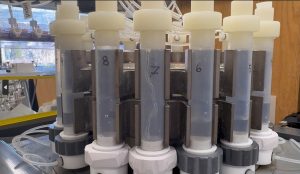
At NOSAMS, organic carbon samples are carefully pre-treated using either acid-base-acid (ABA) methods or acid leaching to ensure accurate results. For select samples, we use our automated OCtoPuS — the Organic Carbon Pretreatment System.
Curious to see how it works? Watch OCtoPuS in action in this short video.
Highlights from the Recent Literature
Keigwin, L.D., Petrie, B., Boyle, E.A. (2025) Slope water intrusions onto Canadian Atlantic continental shelf during the past 1800 Years.Paleoceanography and Paleoclimatology 40, e2025PA005183. https://doi.org/10.1029/2025PA005183
Ryu, Y., Han, H., Na, T., Kim, G., and Hwang, J. (2025) Marginal seas as potential sinks for refractory carbon. Limnol. Oceanogr. 71(1): e70297. https://doi.org/10.1002/lno.70297
Xia, P., Luo, X., Liu, B., Zhang, Y., Meng, X., and Du, J. (2026) The sources and export mechanisms of dissolved organic carbon in pore water of a mangrove swamp revealed by dual carbon isotopes. Catena 263: 109691. https://doi.org/10.1016/j.catena.2025.109691
Pasqualini, A., Smethie, W.M., Newton, R., Schlosser, P. (2026) Deep water renewal in the Amerasian Basin derived from natural and anthropogenic tracer datasets. JGR Oceans 131(1): e2025JC023245. https://doi.org/10.1029/2025JC023245
Tsalickis, A., Waters, M.N., Campbell, J., Vachula, R.S. (2026) Heavy metal-based bat guano chronologies: A cautionary tale. 36(1): 107-111. https://doi.org/10.1177/09596836251378031
Hall, B.L., Putnam, A.E., Lowell, T.V., Denton, G.H., Russell, J.L., Soteres, R.L., Spoth-Ascencao, M.M., Miles, M.L., Thomas, S.G., Moreno, P.I., Schwartz, R., and Schaefer, J.M. (2026) Rapid thinning of the Cordillera Darwin Icefield at the onset of Termination I. Quaternary Science Reviews. 373: 109754. https://doi.org/10.1016/j.quascirev.2025.109754
Boxleitner, K., Spengler, R.N., Alekseitseva, V., Chargynov, T., Abdykanova, A., Sayfuloev, N., Shnaider, S. (2026) Archaeobotanical investigations at high-elevation sites of the Pamier Mountains and Fergana foothills. iScience 29(1): 114349. https://doi.org/10.1016/j.isci.2025.114349
A full bibliography of publications utilizing NOSAMS analyses can be found here.
Did we miss your recent NOSAMS publication? Email us here.
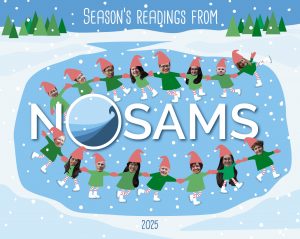
Highlights from the Recent Literature
Barry, P.H. et al. (2025) Carbon, nitrogen, and noble gas isotopes reveal deep volatile signatures in thermal springs in the Central Volcanic Zone (CVZ) of the Andes. Earth Planet Sci. Lett. 651: 11969. https://doi.org/10.1016/j.epsl.2024.119169
Lee, S.C et al., (2025) Sediments near industrial ports can be hotspots of fossil carbon accumulation. Marine Pollution Bulletin 213: 117636 https://doi.org/10.1016/j.marpolbul.2025.117636
Walker, M.R. et al., (2025) Reconstructing Annual Δ14C During Miyake Events Using Deciduous and Evergreen Trees. Global Biogeochemical Cycles 39,e2024GB008423. https://doi.org/10.1029/2024GB008423
Shervette, V.R. et al. (2025) “Bomb radiocarbon in otoliths and eye lenses of reef fishes from Atlantic waters of the southeastern U.S..” Environmental Biology of Fishes, no. 8: 1131-1149. https://doi.org/10.1007/s10641-025-01713-8
A full bibliography of publications utilizing NOSAMS analyses can be found here.
Sue Handwork, Al Gagnon retiring
After a combined 83 years of service, NOSAMS administrator Sue Handwork and prep lab manager Al Gagnon are concluding their distinguished careers at NOSAMS. Al retired earlier this year, and Sue will soon follow. Over the years, many of you have shared how Al and Sue have shaped your experiences at NOSAMS, whether guiding you through the art of flame sealing or helping you navigate complex university payment systems.
Please join us in congratulating Sue and Al as they embark on their next chapters.
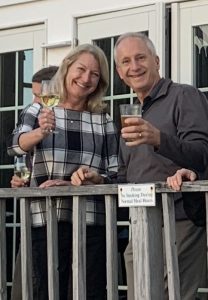
Highlights from the Recent Literature
Jones, B. M., Kanevskiy, M. Z., Ward Jones, M. K., et al. (2025) Cryptic Ice Wedge Networks in Holocene Peat, Yukon-Kuskokwim Delta, Alaska.Permafrost and Periglacial Processes, 0:1-24 https://doi.org/10.1002/ppp.70004
Sert, M. F., Bernstein, H. C., Dølven, K. O., et al. (2025) Cold Seeps and Coral Reefs in Northern Norway: Carbon Cycling in Marine Ecosystems With Coexisting Features Journal of Geophysical Research: Biogeosciences, no. 3: e2024JG008475. https://doi.org/10.1029/2024JG008475
Gremillion, S. L., Wallace, D. J., Eisemann, E. R. (2025) Interdisciplinary Applications for Identifying and Quantifying Modern Storm Washover Deposits on Pea Island, North Carolina, USA. Journal of Geophysical Research: Oceans, no. 5: e2024JC021695. https://doi.org/10.1029/2024JC021695
A full bibliography of publications utilizing NOSAMS analyses can be found here.
NOSAMS leading 14C-DIC interlaboratory comparison
Internationally recognized standard material does not exist for the 14C analysis of dissolved inorganic carbon (DIC), creating challenges for laboratories seeking to carry out this analysis. NOSAMS is leading an effort to carry out the first 14C-DIC interlaboratory comparison. The exercise will include surface and deep (2200 m) seawater collected from Station ALOHA located in the North Pacific subtropical gyre. Depending on availability, we will also distribute radiocarbon depleted groundwater.
If you would like to participate in the intercomparison please let us know here.
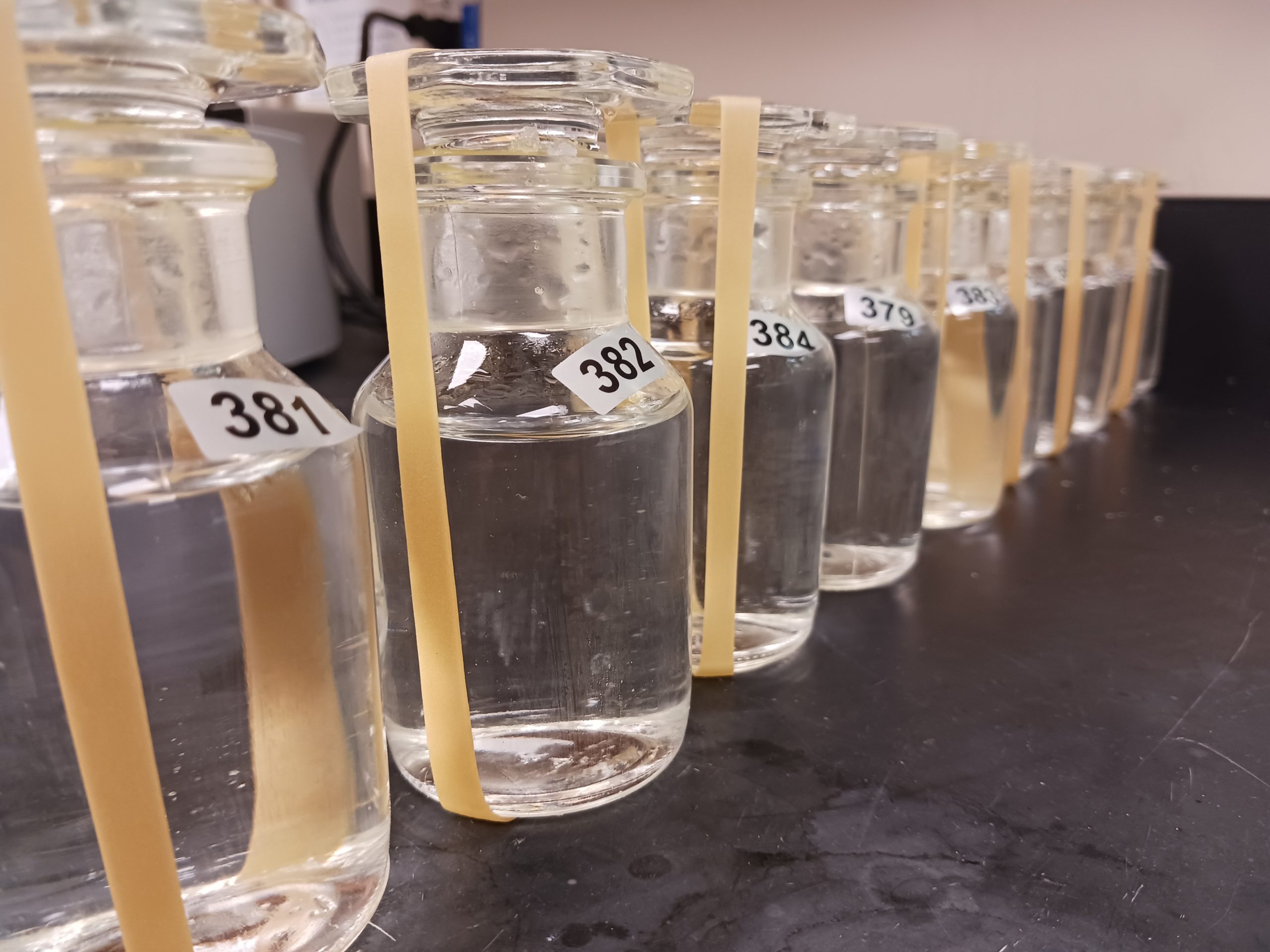
Call for Applications: NOSAMS Postdoctoral Scholar
We invite applications from innovative and driven researchers to carry out radiocarbon research at the NOSAMS facility. We seek an outstanding individual to pursue work in one or both of the following areas: (i) radiocarbon in oceanic systems (ii) advances in accelerator mass spectrometry and related techniques. Applicants can carry out research with any WHOI scientific staff member on their research interests. Applications are due December 1, 2025. More information can be found here.
Highlights from the Recent Literature
Sparrow K.J., Chanton J.P., Hanke U.M., Kurz, M.D., McNichol A.P. (2024) Peatland organic matter quality varies with latitude as suggested by combination of FTIR and Ramped Pyrolysis Oxidation. PLoS ONE 19(11): e0309654. https://doi.org/10.1371/journal.pone.0309654
Tremblay, M., J.C. Stager, J.M. St-Jacques, S. Murphy, M., Peros, B.S. Carl. (2024) A 13,000 year history of vegetation and fire in a rare inland pine barrens: The Albany Pine Bush (Albany County, New York, USA). PLoS ONE https://doi.org/10.1371/journal.pone.0314101
Fang, W., Evangeliou, N., Eckhardt, Sabine, E., Xiao, H., and Li, H. (2025). Unprecedented shifts in aerosol pollution sources in China under a decade of clean air actions. Communications Earth & Environment, no. 1 (2025): 512. https://doi.org/10.1038/s43247-025-02487-8
Arora, S., Meenan, N., Srivastava, E., Cochran, D., et al. (2025) Earthquake rupture variability along the central seismic gap segment (78°– 82°E) of the Himalayan Frontal Thrust, Western and Central Himalaya. Scientific Reports, no. 1 (2025): 21916. https://doi.org/10.1038/s41598-025-07274-1
Hulver, A.M., Teixidó, N., Kemp, D. W., et al. (2025) High heterotrophic capacity favors Mediterranean coral success and resilience in the face of ocean acidification Coral Reefs, 44:1041-1054. https://doi.org/10.1007/s00338-025-02663-4
A full bibliography of publications utilizing NOSAMS analyses can be found here.
Happy Holidays from NOSAMS
The past six months have been very busy at the NOSAMS facility. In September we hosted a MICADAS workshop that brought together 42 people from 18 international institutions at WHOI, plus an additional 38 online participants.
Mark Roberts has recently retired after 22+ productive years as Staff Physicist with the facility. We are happy to report he will maintain an Emeritus role at NOSAMS.
Last week we hosted an Introduction to Radiocarbon workshop in Washington, D.C. prior to the AGU Fall Meeting. Attendees had the opportunity to practice sampling and discuss issues ranging from preventing contamination to nomenclature.
Our fees will be increasing effective April 2025. The new fee chart can be found on our website.
Highlights from the recent literature
Lester, J. G., Graven, H. D., Khatiwala, S., McNichol, A.P. (2024) Changes in Oceanic Radiocarbon and CFCs Since the 1990s.” Journal of Geophysical Research-Oceans 129, e2023JC020387. https://doi.org/10.1029/2023JC020387
McHugh, C. M., Seeber, L., Gulick, Sean P.S., et al. (2024) Sedimentary signatures of large earthquakes along the submerged Enriquillo−Plantain Garden transpressional plate boundary, northern Caribbean.” Geology . https://doi.org/10.1130/G52258.1
Goldstein, S. T., Mueller, N. G., Janzen, A., et al. (2024) Early agriculture and crop transitions at Kakapel Rockshelter in the Lake Victoria region of eastern Africa.” Proceedings of the Royal Society B: Biological Sciences, no. 2026 : 20232747. https://doi.org/10.1098/rspb.2023.2747
A full bibliography of publications utilizing NOSAMS analyses can be found here.
|
||||||||||||
|
Dear Friends of NOSAMS,
These past few months have been a productive time at NOSAMS and we are writing to update you on recent changes.
We are excited to announce that we have purchased a new MIni CArbon DAting System (MICADAS), manufactured by IonPlus, with funds from a successful NSF MRI proposal and WHOI cost sharing. It was installed in April, 2022 and passed final site acceptance tests in July, 2022. Samples can be introduced as graphite or via the Gas Interface System (GIS) with an Elemental Analyzer for organic samples or with a Carbonate System for inorganic samples. Over the next several months we will be offering these lower cost, lower precision carbonate and ready-to-burn organic carbon analyses using the hybrid gas interface MICADAS peripherals. Please contact us at nosams@whoi.edu for details. Thank you to NSF and the radiocarbon community for their support!
After 7 years of distinguished service, Dr. Mark Kurz has stepped down as NOSAMS Director and Dr. Susan Lang has taken up the post. The staff is very grateful to Mark who helped steer the facility through key staffing changes, the pandemic, and the funding of the MICADAS.
Dr. Susan Lang started as the new NOSAMS Director in May, 2022. She has a strong background using radiocarbon in the areas of dissolved organic carbon and compound specific analyses of small polar molecules. She has a long-standing interest in developing new radiocarbon and stable carbon methods.
As always, please visit our website for more information on all of our current services and fees.
All the best, the NOSAMS Facility Staff
We are excited to announce that we have purchased a new MIni CArbon DAting System (MICADAS), manufactured by IonPlus, with funds from a successful NSF MRI proposal and WHOI cost sharing. It was installed in April, 2022 and passed final site acceptance tests in July, 2022. Samples can now be introduced as graphite or via the Gas Interface System (GIS) with an Elemental Analyzer for organic samples or with a Carbonate Handling System for inorganic samples. Over the next several months we will be starting to offer lower cost, lower precision carbonate and ready-to-burn organic carbon analyses using the hybrid gas interface MICADAS peripherals.
Thank you to NSF and the radiocarbon community for their support!
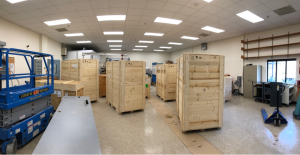
MICADAS, the early days
Sue Handwork was recently recognized at the WHOI Employee Appreciation Celebration for her 40 years of service, of which 28 have been at NOSAMS. Also recognized were Mark Roberts (20 years), Mary Lardie Gaylord (20 years) and Kalina Gospodinova (10 years). Congratulations and thank you to all of these hard working, long serving NOSAMS staff.
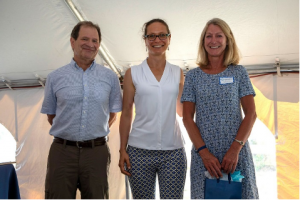
Sue Handwork (right) receiving recognition for her 40 years of service to WHOI. Also pictured are the recent NOSAMS Director Dr. Mark Kurz (left) and current NOSAMS Director Dr. Susan Lang (middle).
